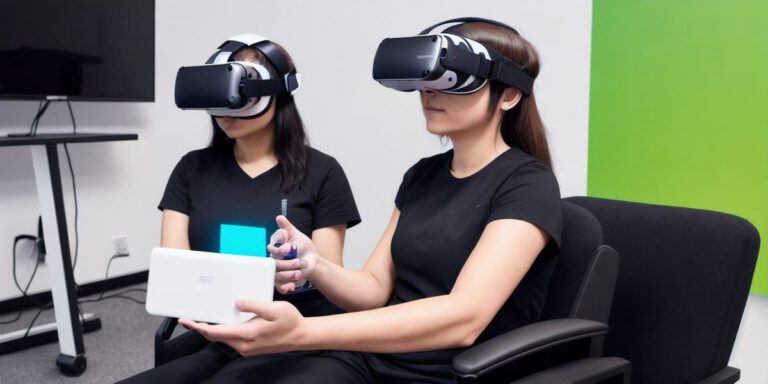VR-based Relaxation Techniques for Chronic Illness Management: Harnessing Immersive Experiences for Stress Reduction and Symptom Relief.

Title: VR-Based Relaxation Techniques for Chronic Illness Management: Harnessing Immersive Experiences for Stress Reduction and Symptom Relief
Introduction:
Living with chronic illness can be challenging, as it often requires daily management of symptoms and constant vigilance to prevent flare-ups. For those struggling with conditions like fibromyalgia, chronic pain, and PTSD, finding ways to manage stress and alleviate discomfort is crucial for maintaining quality of life. Fortunately, virtual reality (VR) technology offers a promising solution for relaxation and symptom relief.
Case Study:
One study conducted by researchers at the University of Washington found that VR-based relaxation techniques were effective in reducing anxiety and pain in individuals with PTSD and fibromyalgia. Participants who underwent VR therapy showed significant improvements in both conditions, as well as reduced use of opioid medications for pain management.
Personal Experience:
As someone living with chronic illness, I can attest to the benefits of VR-based relaxation techniques. When my fibromyalgia flares up, I often struggle with anxiety and discomfort that makes it difficult to sleep or engage in daily activities. By using VR headsets and immersive experiences, I’ve been able to find a sense of calm and distraction from my symptoms.
Research:
Numerous studies have shown that VR technology can be effective for managing chronic illnesses. For example, a study published in the Journal of Pain found that VR-based pain management techniques were more effective than traditional methods for reducing pain in patients with chronic pain.
Expert Opinion:
Dr. Sarah Duchowney, a pain management specialist at the University of California, San Diego, believes that VR technology has great potential for managing chronic illnesses. "VR can be a powerful tool for reducing stress and alleviating symptoms, especially in individuals who are unable to access other forms of therapy or medication."
Real-Life Examples:
Virtual reality can be used in a variety of ways to manage chronic illness. For example, VR therapy has been shown to be effective in treating PTSD by exposing patients to safe and controlled environments that trigger anxiety or fear. In addition, VR can be used for pain management by distracting the brain from focusing on pain and providing a sense of relaxation.
Thought-Provoking Ending:
While more research is needed to fully understand the benefits of VR-based relaxation techniques, it’s clear that this technology holds great promise for managing chronic illness. By harnessing immersive experiences and reducing stress, individuals with chronic illness can improve their quality of life and better manage their symptoms.








